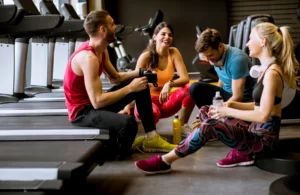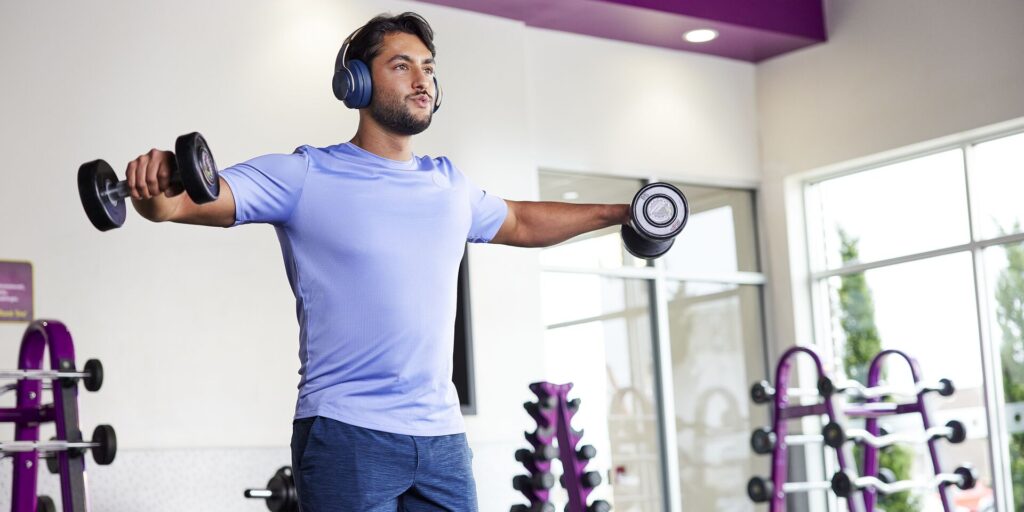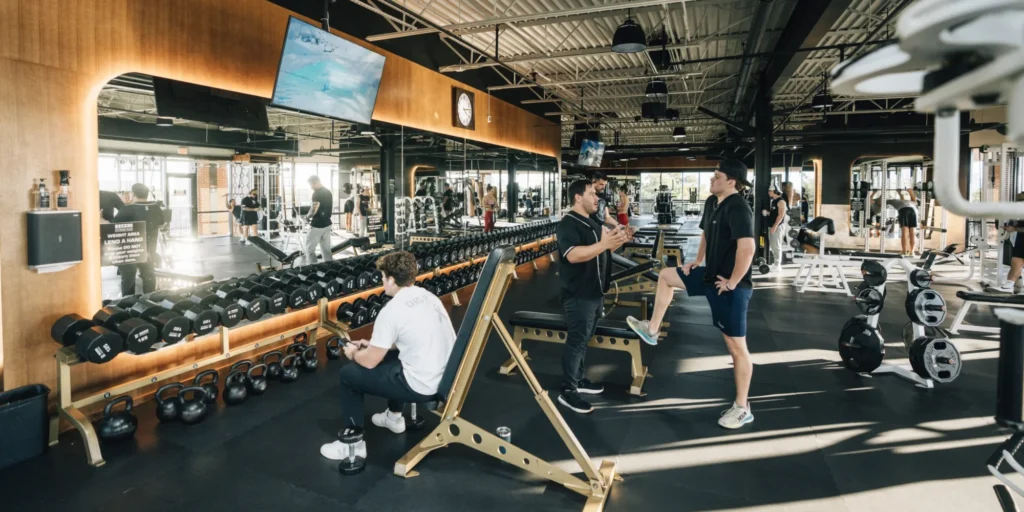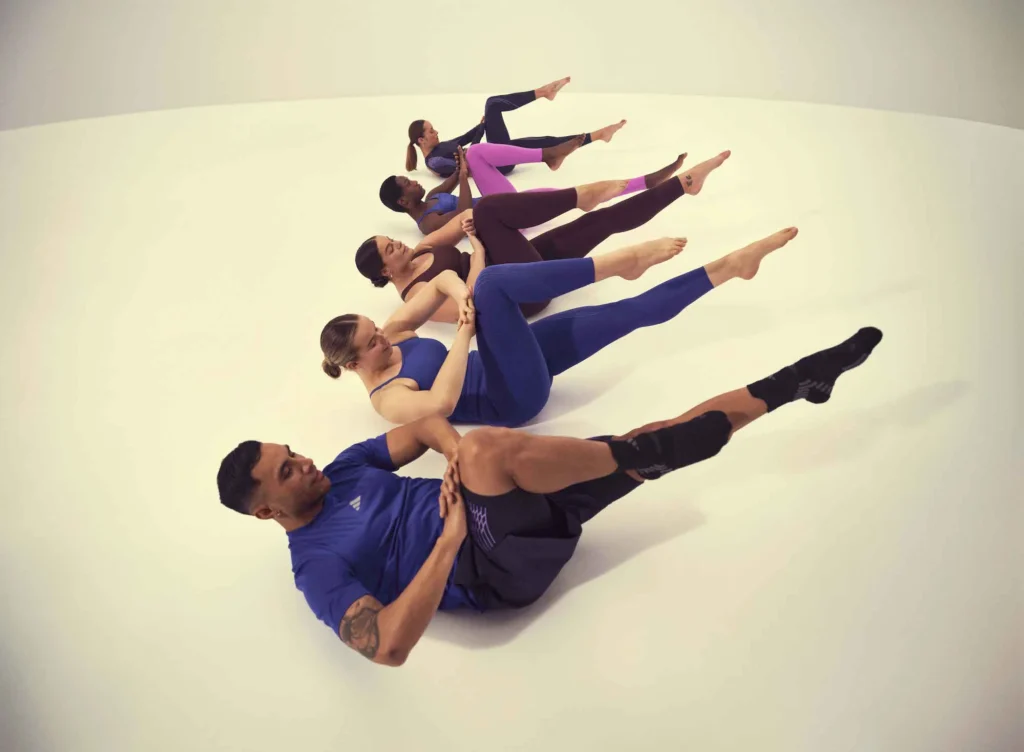
From adding strength equipment to turning gyms into “third spaces,” top fitness brands are all seeking to earn a slice of the coveted Gen Z pie
Few generations are written and spoken about these days more than Gen Z—and for good reason.
Gen Z’s spending power is expected to grow to $12 trillion by 2030, according to NielsenIQ and GfK. It’s a value-driven generation navigating cost-of-living concerns, seeking purpose in their careers, questioning the impact of generative AI on their future and embracing work-life balance and mental well-being more openly than past generations.
It’s also a generation that fitness and wellness brands are aggressively targeting, from boutique fitness franchises to big-box gyms and more. The impact and potential of Gen Z is widespread, shaping residential real estate and giving rise to brands aiming to become a “third space.”
Let’s dive in.
Deadlifts & Aesthetics: Big-Box Gyms Add New Offerings
Leading the charge in capturing the spending power of Gen Z are high-value, low-price (HVLP) gym brands like Planet Fitness, Crunch Fitness and Chuze Fitness. These gym models offer an approachable entry point into the world of fitness memberships, with messaging that promotes inclusivity and welcomes beginners.
Planet Fitness, the “Judgement Free” gym leader, has long focused on attracting young fitness consumers, offering free access to its clubs during the summer months through its High School Summer Pass program.

“Our clubs are also known for providing such a friendly atmosphere,” one young Planet Fitness trainer in Seaford, Delaware, said. “The environment is very welcoming, which makes it a lot easier for younger people, 13 and up, to feel comfortable, especially if it’s their first time working out.”
More recently, the HVLP leader announced it would be adding new plate-loaded strength equipment to nearly all of its U.S. locations this year, including the Magnum Supine Bench Press, Hack Squat, and Seated Calf Machine—news sure to capture the interest of Gen Z, which has embraced strength training as one of its favorite workout formats.
Crunch Fitness has made similar strides in winning over Gen Z with its catchy ad campaigns, group fitness offerings and an upcoming “Crunch 3.0” rollout that is sure to be a hit with Gen Z. The new design template includes an aesthetic overhaul, new equipment and group fitness enhancements, additional functional training areas with turf and a dedicated recovery studio.
Chuze Fitness continues appealing to Gen Z with its messaging that prioritizes kindness, which is reflected in its latest ad campaign and its free, 7-day pass where members are encouraged to bring their friends.
The gym brand is set to open another eight clubs this year and is retrofitting its Lift Lab studios into several existing clubs. The Lift Lab is accessed by key card and features squat racks, platforms, glute machines and other unique equipment typically not seen on the main gym floor. Group fitness classes are also available to members, which Gen Z appreciates for its social nature.
A departure from the HVLP space, Dallas-based Recess Fitness has zeroed in on older Gen Z with its 18-and-up membership requirement, drawing serious fitness enthusiasts willing to accept a $50 re-rack fee. But the gym’s true hook is its homage to youth and Instagram-worthy aesthetic—natural light, a functional gold slide connecting two floors and group fitness classes. It’s become a favorite among Gen Z, who have flooded TikTok with clips of the space and has gained recognition among young female members who appreciate its divine bathrooms.
“We knew that there was an opportunity for something better,” Recess Fitness co-founder Evan Duncan told ATN. “Gyms were so stale and stagnant, it seemed this 30-40 year deal of high volume, low-cost gyms, and everyone knew what to expect. It was sterile wall colors, the same fixed-motion equipment that had always been around.”
“We knew that there was a population out there that was serious about their gym experience, and they went regularly, but they were looking for something more,” Duncan added. “And then it was those that just never really made it in because they had such a negative experience with what was offered in the gym scene.”

Les Mills Goes Low Impact, High Vibes
Les Mills, the international fitness brand licensed in 20,000 clubs, is expanding its exercise offerings to match its global reach. The brand just announced the launch of Les Mills Pilates, a new program that repurposes the classic exercise modality in a new format to attract Gen-Z fitness enthusiasts.
Les Mills Pilates went through 50 rounds of tests and revisions, according to the brand, to deliver a marquee Pilates experience and ensure long-term retention. The program inserts into any studio with ease thanks to its speedy instructor certification process and a mat being its lone equipment requirement. It differs from traditional Pilates classes, ushering in new music and the uplifting coaching style Les Mills is famous for.
“Being able to deliver Les Mills Pilates in any space, with nothing more than an optional mat, means clubs can quickly bring the world’s hottest trend to their studios and engage a broad range of members,” said Les Mills Pilates co-creator Summer Bradley. “The program pays homage to Joseph Pilates, blending the best of old with the best of new as we add unique music, beautiful choreography and supportive coaching to offer members an unforgettable experience.”

As digitally-native consumers, Les Mills has also discovered through its research that Gen Z expects high-quality digital options and that they like having various options and working out in a social setting. To that point, Les Mills says 81% of Gen Z gym-goers participate in group workouts. Strength training also showed massive interest—and Les Mills has responded with Strength Development, a group training program combining heavy compound lifting, sports conditioning and performance training techniques.
Wellness-Focused Living & Women-Only Spaces
Gen Z’s interest in fitness and wellness is also reshaping residential real estate. While they may seem glued to their phones, Gen Z craves community. With homeownership either out of reach or simply not a priority, many young consumers are opting for shared living spaces with friends or settling into vibrant residential buildings that integrate fitness and wellness amenities.
Developers are taking note, going beyond the standard common space gym to incorporate indoor and outdoor fitness areas, meditation spaces and shared bike programs. Some fitness brands, including Solidcore and JetSet Pilates, are capitalizing on this shift by moving into mixed-use buildings, offering residents quick and easy access to their studios.
Gen Z female fitness consumers have also shown a preference for working out in separate spaces away from their male peers—a demand that some brands have embraced to varying degrees.
While the concept might be easy to dismiss in an era of inclusivity, a recent study found that nearly half (46.6%) of women have received an unsolicited compliment on their appearance at the gym, with the majority (71.9%) coming from men. The study also revealed that many respondents feel intimidated by men while exercising and often struggle to claim space in the gym.
Several fitness brands have introduced women-only gyms or designated workout zones tailored for female members. Concepts like Blush Boot Camp, Kaia Fit and Ladies First Fitness & Spa cater specifically to women, providing a more comfortable and community-driven fitness experience. One standout is Jersey Girls, a women-only gym under the Giant Fitness banner, featuring pink fitness equipment.
Climbing Gyms Offer a ‘Third Space’
Lastly, other entities are positioning themselves as a “third space” for Gen Z—a fun, welcoming environment where the focus is less on sculpting six-pack abs and more on building social connections.
Movement Gyms has poised itself to be a leader in this space with its climbing and fitness chain offering group fitness classes alongside indoor rock climbing. It’s an activity that requires a singular focus, offering a much-needed mental health break from staring at the phone or other devices.

“Even without meaning to, you have to zero in on what you’re doing,” Movement Gyms co-founder and CEO Anne-Worley Moelter said. “I think that that is something that people appreciate in today’s scattered world.”
The rock climbing brand offers several classes that encourage meeting new people, including an instructor-led climbing session, an introduction to rope-climbing or bouldering class, and a four-week beginner rock climbing course.
“It isn’t just about going in, putting in your headphones, doing your 45 minutes of workout and leaving,” Moelter added. “It’s an entirely different perspective that I consider much more holistic.”
This article originally appeared in ATN’s Member Success Blueprint Report 2025, which highlights essential steps brands will want to take to ensure success in the current calendar year and beyond. Download the free report.
